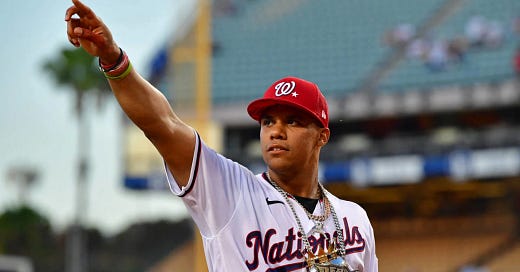Should Juan Soto Stay a National?
By the time I came of age as a sports fan, the idea of the star athlete who only played for one team was already becoming a relic. Even icons like Michael Jordan, Ken Griffey Jr., and Tom Brady, who it was once impossible to imagine on any team but the one that drafted them ended up wearing different uniforms by the end of their careers. There are some exceptions (Derek Jeter, Kobe Bryant), and likely always will be (Stephen Curry?), but it’s becoming rarer and rarer. Fans are no longer even that sentimental about it.
When I was a kid, though, this change was always attributed to the players. Ever since free agency became the norm, players could (eventually) choose to go where they wanted. Fans used to hope stars would be loyal to their original team, and give them the “hometown discount” when they were eligible for free agency, but as more and more guys took the money, such hope became more and more fruitless. Additionally, as player autonomy has become more standard across sports, it’s come to seem quaint, old-fashioned, or even anti-labor to suggest that a player owes his original team any deference.
But recently, at least in baseball, the idea of a one-team star has taken on a different color, as highlighted by the Juan Soto situation. It was reported this week that the Washington Nationals are open to trading Soto, after he turned down a 15-year, $440 million deal. That top-line number is impressive, as it would be the biggest sports contract in North American history, at least in terms of its total value. But at $29.33 million per year, the deal would make Soto, who is only 23 and very likely the best hitter in baseball, only the 15th highest paid player in baseball this season, and of course that ranking is only likely to go down as player salaries increase. The Nationals would be paying Soto 15% less than they’re paying Stephen Strasburg, who has pitched ~30 total innings in the last three years.
In this way, the offer seems almost designed to be rejected, so that the Nationals can then justify trading him. This is not just paranoia—it’s become a trend in baseball, ever since the Mookie Betts deal. Now, instead of letting players leave in free agency, teams are pre-emptively trading them whenever they don’t agree to below-market contracts. Cleveland did it with Francisco Lindor; Baltimore did it with Manny Machado; the Cubs apparently didn’t even make Kris Bryant an offer before shipping him out of town. All these players were fan favorites, all were open to staying with their hometown team, and yet all were shipped out by an ownership team that was simply unwilling to pay them.
Some people will insist that these teams are simply making “smart moves,” since front offices have managed to trick fans into thinking a “smart move” is whatever saves the owners’ money. Defenders will say the owners were merely acting preemptively, getting some prospects in return for a player who was going to leave anyway. They will say that “small market” teams simply can’t keep up with big spenders like the Dodgers, so they need to get what value they can.
But, even if we are to accept the fiction of “small market” teams, the Juan Soto situation shows that this is not restricted to such teams: DC and Chicago, two of the biggest media markets in the country, have been some of the worst offenders. These are teams that could afford to pay players what they are worth—they just don’t want to. The fans might want it, and the players certainly want it, but they don’t matter. The owners would rather be worse, lose more, and keep more money for themselves.
Personally, I think it would be nice if Juan Soto could stay on the Nationals forever. Keeping stars on the teams they start with is good for the league—it keeps fans interested and invested even during down years. That’s why other leagues make rules to encourage it. Of course, players should have autonomy, and if Soto WANTS to go elsewhere, he should certainly have that option. But it would be nice if that wasn’t the only way he could get paid his fair share.
I guess this is all a long way of making the same point I made earlier this week, about the Freddie Freeman situation: Free agency isn’t enough. It’s obviously a net positive, in that it allows players to get paid closer to their fair share, but the problem with capitalism is not limited to wages. It’s about ownership and about power. In order to give powers to the workers, we need to take it away from the owners. We need socialism.



